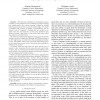Free Online Productivity Tools
i2Speak
i2Symbol
i2OCR
iTex2Img
iWeb2Print
iWeb2Shot
i2Type
iPdf2Split
iPdf2Merge
i2Bopomofo
i2Arabic
i2Style
i2Image
i2PDF
iLatex2Rtf
Sci2ools
127
click to vote
FOCS
2009
IEEE
2009
IEEE
The Complexity of Rationalizing Network Formation
— We study the complexity of rationalizing network formation. In this problem we fix an underlying model describing how selfish parties (the vertices) produce a graph by making individual decisions to form or not form incident edges. The model is equipped with a notion of stability (or equilibrium), and we observe a set of “snapshots” of graphs that are assumed to be stable. From this we would like to infer some unobserved data about the system: edge prices, or how much each vertex values short paths to each other vertex. We study two rationalization problems arising from the network formation model of Jackson and Wolinsky [14]. When the goal is to infer edge prices, we observe that the rationalization problem is easy. The problem remains easy even when rationalizing prices do not exist and we instead wish to find prices that maximize the stability of the system. In contrast, when the edge prices are given and the goal is instead to infer valuations of each vertex by each othe...
Edge Prices | FOCS 2009 | Network Formation | Rationalization Problem | Theoretical Computer Science |
Related Content
| Added | 20 May 2010 |
| Updated | 20 May 2010 |
| Type | Conference |
| Year | 2009 |
| Where | FOCS |
| Authors | Shankar Kalyanaraman, Christopher Umans |
Comments (0)

